Organisational Behaviour in Hospitality: Culture, Motivation and Teams
VerifiedAdded on 2023/01/16
|11
|3212
|44
Report
AI Summary
This report provides a detailed analysis of organisational behaviour within the hospitality industry, using Holiday Inn as a case study. It examines the influence of organisational culture, politics, and power on employee behaviour, referencing Handy's model of organisational culture. The report then evaluates content and process theories of motivation, including Maslow's Hierarchy of Needs and Expectancy Theory, and how these theories and motivational techniques can facilitate goal achievement. The report also explains the characteristics of effective and ineffective teams, and applies concepts of organisational behaviour within an organisational context, including the application of Tuckman's theory of team development to a scenario involving an international science conference at Holiday Inn. The report concludes by summarizing the key findings and implications for hospitality management.
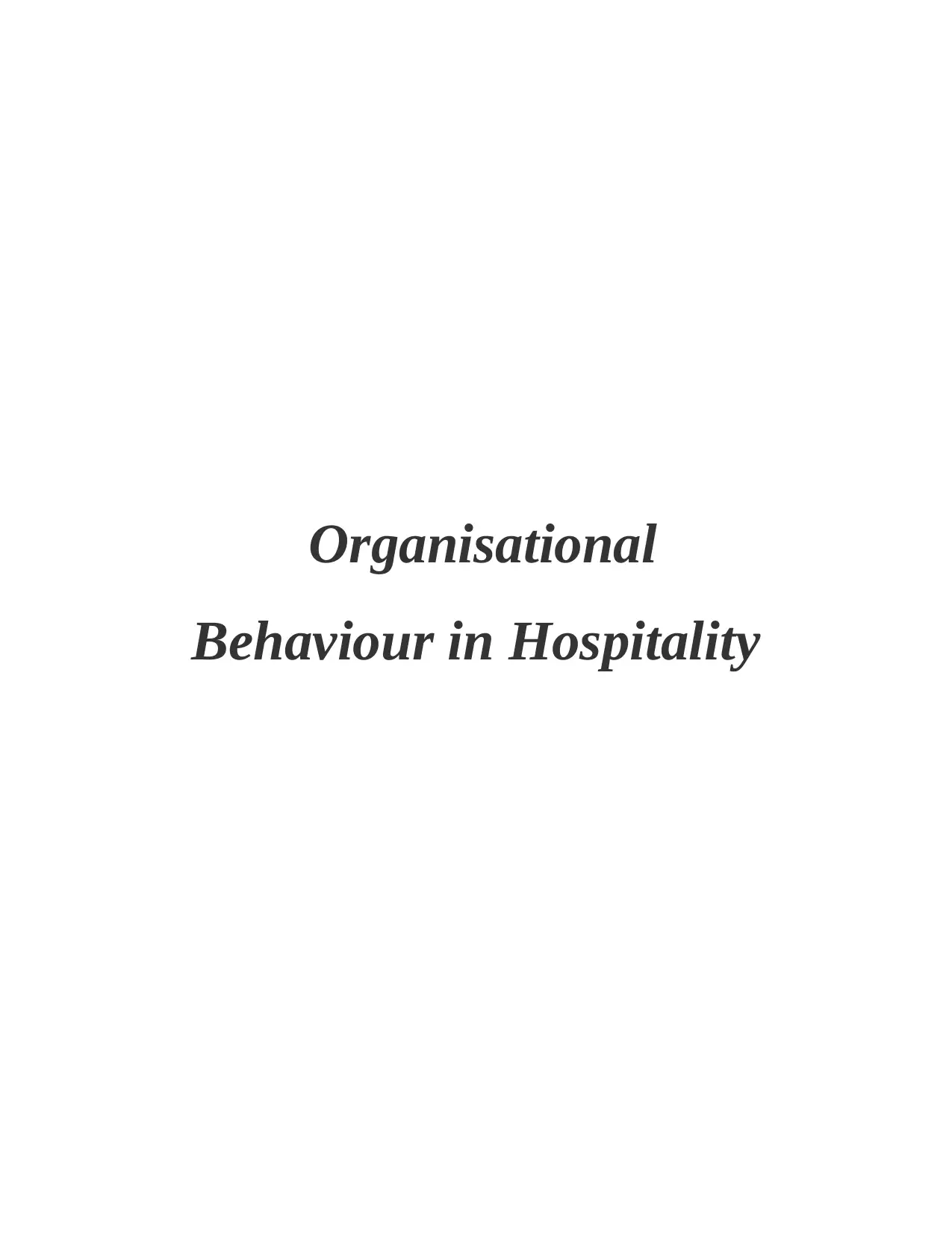
Organisational
Behaviour in Hospitality
Behaviour in Hospitality
Paraphrase This Document
Need a fresh take? Get an instant paraphrase of this document with our AI Paraphraser
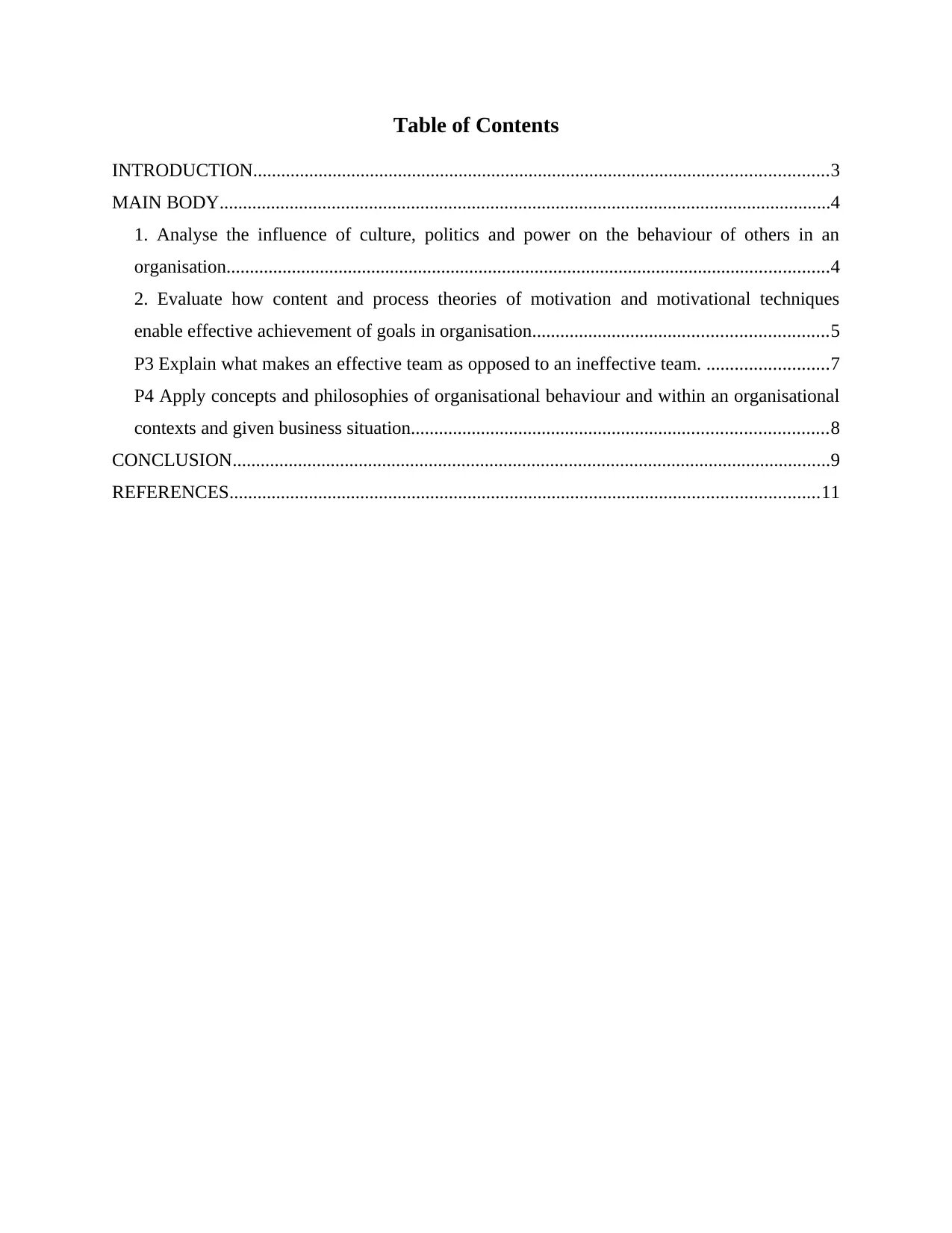
Table of Contents
INTRODUCTION...........................................................................................................................3
MAIN BODY...................................................................................................................................4
1. Analyse the influence of culture, politics and power on the behaviour of others in an
organisation.................................................................................................................................4
2. Evaluate how content and process theories of motivation and motivational techniques
enable effective achievement of goals in organisation...............................................................5
P3 Explain what makes an effective team as opposed to an ineffective team. ..........................7
P4 Apply concepts and philosophies of organisational behaviour and within an organisational
contexts and given business situation.........................................................................................8
CONCLUSION................................................................................................................................9
REFERENCES..............................................................................................................................11
INTRODUCTION...........................................................................................................................3
MAIN BODY...................................................................................................................................4
1. Analyse the influence of culture, politics and power on the behaviour of others in an
organisation.................................................................................................................................4
2. Evaluate how content and process theories of motivation and motivational techniques
enable effective achievement of goals in organisation...............................................................5
P3 Explain what makes an effective team as opposed to an ineffective team. ..........................7
P4 Apply concepts and philosophies of organisational behaviour and within an organisational
contexts and given business situation.........................................................................................8
CONCLUSION................................................................................................................................9
REFERENCES..............................................................................................................................11
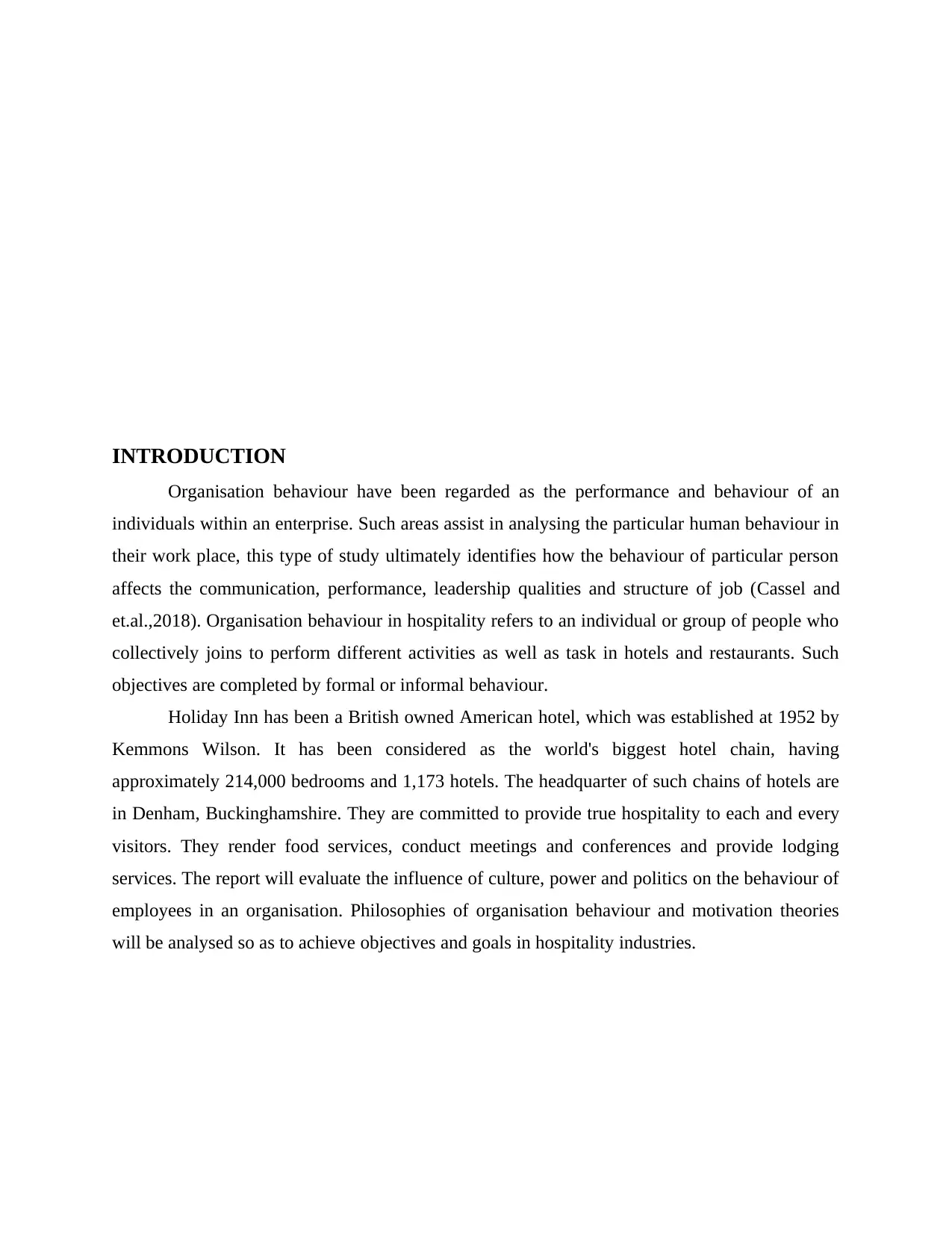
INTRODUCTION
Organisation behaviour have been regarded as the performance and behaviour of an
individuals within an enterprise. Such areas assist in analysing the particular human behaviour in
their work place, this type of study ultimately identifies how the behaviour of particular person
affects the communication, performance, leadership qualities and structure of job (Cassel and
et.al.,2018). Organisation behaviour in hospitality refers to an individual or group of people who
collectively joins to perform different activities as well as task in hotels and restaurants. Such
objectives are completed by formal or informal behaviour.
Holiday Inn has been a British owned American hotel, which was established at 1952 by
Kemmons Wilson. It has been considered as the world's biggest hotel chain, having
approximately 214,000 bedrooms and 1,173 hotels. The headquarter of such chains of hotels are
in Denham, Buckinghamshire. They are committed to provide true hospitality to each and every
visitors. They render food services, conduct meetings and conferences and provide lodging
services. The report will evaluate the influence of culture, power and politics on the behaviour of
employees in an organisation. Philosophies of organisation behaviour and motivation theories
will be analysed so as to achieve objectives and goals in hospitality industries.
Organisation behaviour have been regarded as the performance and behaviour of an
individuals within an enterprise. Such areas assist in analysing the particular human behaviour in
their work place, this type of study ultimately identifies how the behaviour of particular person
affects the communication, performance, leadership qualities and structure of job (Cassel and
et.al.,2018). Organisation behaviour in hospitality refers to an individual or group of people who
collectively joins to perform different activities as well as task in hotels and restaurants. Such
objectives are completed by formal or informal behaviour.
Holiday Inn has been a British owned American hotel, which was established at 1952 by
Kemmons Wilson. It has been considered as the world's biggest hotel chain, having
approximately 214,000 bedrooms and 1,173 hotels. The headquarter of such chains of hotels are
in Denham, Buckinghamshire. They are committed to provide true hospitality to each and every
visitors. They render food services, conduct meetings and conferences and provide lodging
services. The report will evaluate the influence of culture, power and politics on the behaviour of
employees in an organisation. Philosophies of organisation behaviour and motivation theories
will be analysed so as to achieve objectives and goals in hospitality industries.
⊘ This is a preview!⊘
Do you want full access?
Subscribe today to unlock all pages.

Trusted by 1+ million students worldwide
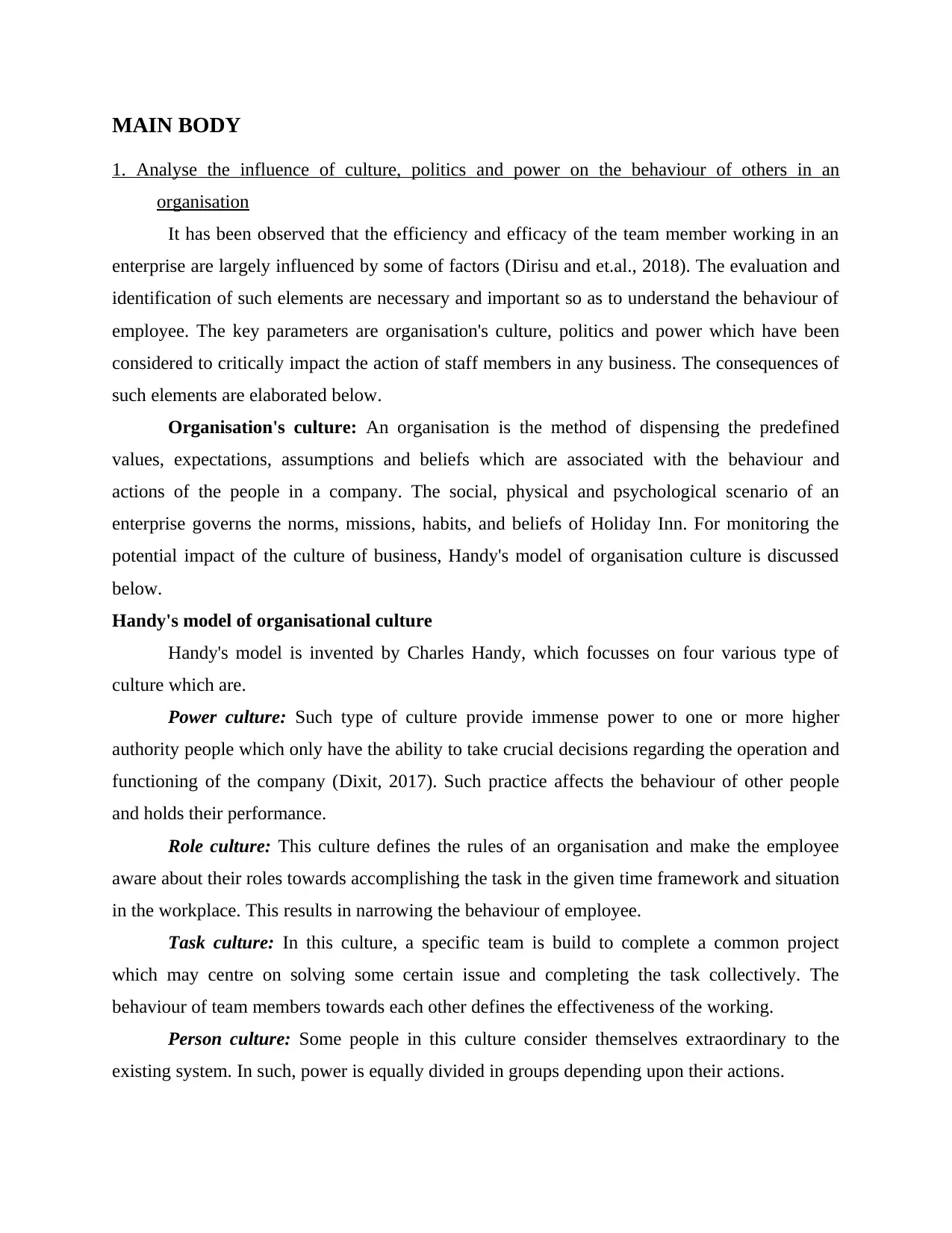
MAIN BODY
1. Analyse the influence of culture, politics and power on the behaviour of others in an
organisation
It has been observed that the efficiency and efficacy of the team member working in an
enterprise are largely influenced by some of factors (Dirisu and et.al., 2018). The evaluation and
identification of such elements are necessary and important so as to understand the behaviour of
employee. The key parameters are organisation's culture, politics and power which have been
considered to critically impact the action of staff members in any business. The consequences of
such elements are elaborated below.
Organisation's culture: An organisation is the method of dispensing the predefined
values, expectations, assumptions and beliefs which are associated with the behaviour and
actions of the people in a company. The social, physical and psychological scenario of an
enterprise governs the norms, missions, habits, and beliefs of Holiday Inn. For monitoring the
potential impact of the culture of business, Handy's model of organisation culture is discussed
below.
Handy's model of organisational culture
Handy's model is invented by Charles Handy, which focusses on four various type of
culture which are.
Power culture: Such type of culture provide immense power to one or more higher
authority people which only have the ability to take crucial decisions regarding the operation and
functioning of the company (Dixit, 2017). Such practice affects the behaviour of other people
and holds their performance.
Role culture: This culture defines the rules of an organisation and make the employee
aware about their roles towards accomplishing the task in the given time framework and situation
in the workplace. This results in narrowing the behaviour of employee.
Task culture: In this culture, a specific team is build to complete a common project
which may centre on solving some certain issue and completing the task collectively. The
behaviour of team members towards each other defines the effectiveness of the working.
Person culture: Some people in this culture consider themselves extraordinary to the
existing system. In such, power is equally divided in groups depending upon their actions.
1. Analyse the influence of culture, politics and power on the behaviour of others in an
organisation
It has been observed that the efficiency and efficacy of the team member working in an
enterprise are largely influenced by some of factors (Dirisu and et.al., 2018). The evaluation and
identification of such elements are necessary and important so as to understand the behaviour of
employee. The key parameters are organisation's culture, politics and power which have been
considered to critically impact the action of staff members in any business. The consequences of
such elements are elaborated below.
Organisation's culture: An organisation is the method of dispensing the predefined
values, expectations, assumptions and beliefs which are associated with the behaviour and
actions of the people in a company. The social, physical and psychological scenario of an
enterprise governs the norms, missions, habits, and beliefs of Holiday Inn. For monitoring the
potential impact of the culture of business, Handy's model of organisation culture is discussed
below.
Handy's model of organisational culture
Handy's model is invented by Charles Handy, which focusses on four various type of
culture which are.
Power culture: Such type of culture provide immense power to one or more higher
authority people which only have the ability to take crucial decisions regarding the operation and
functioning of the company (Dixit, 2017). Such practice affects the behaviour of other people
and holds their performance.
Role culture: This culture defines the rules of an organisation and make the employee
aware about their roles towards accomplishing the task in the given time framework and situation
in the workplace. This results in narrowing the behaviour of employee.
Task culture: In this culture, a specific team is build to complete a common project
which may centre on solving some certain issue and completing the task collectively. The
behaviour of team members towards each other defines the effectiveness of the working.
Person culture: Some people in this culture consider themselves extraordinary to the
existing system. In such, power is equally divided in groups depending upon their actions.
Paraphrase This Document
Need a fresh take? Get an instant paraphrase of this document with our AI Paraphraser
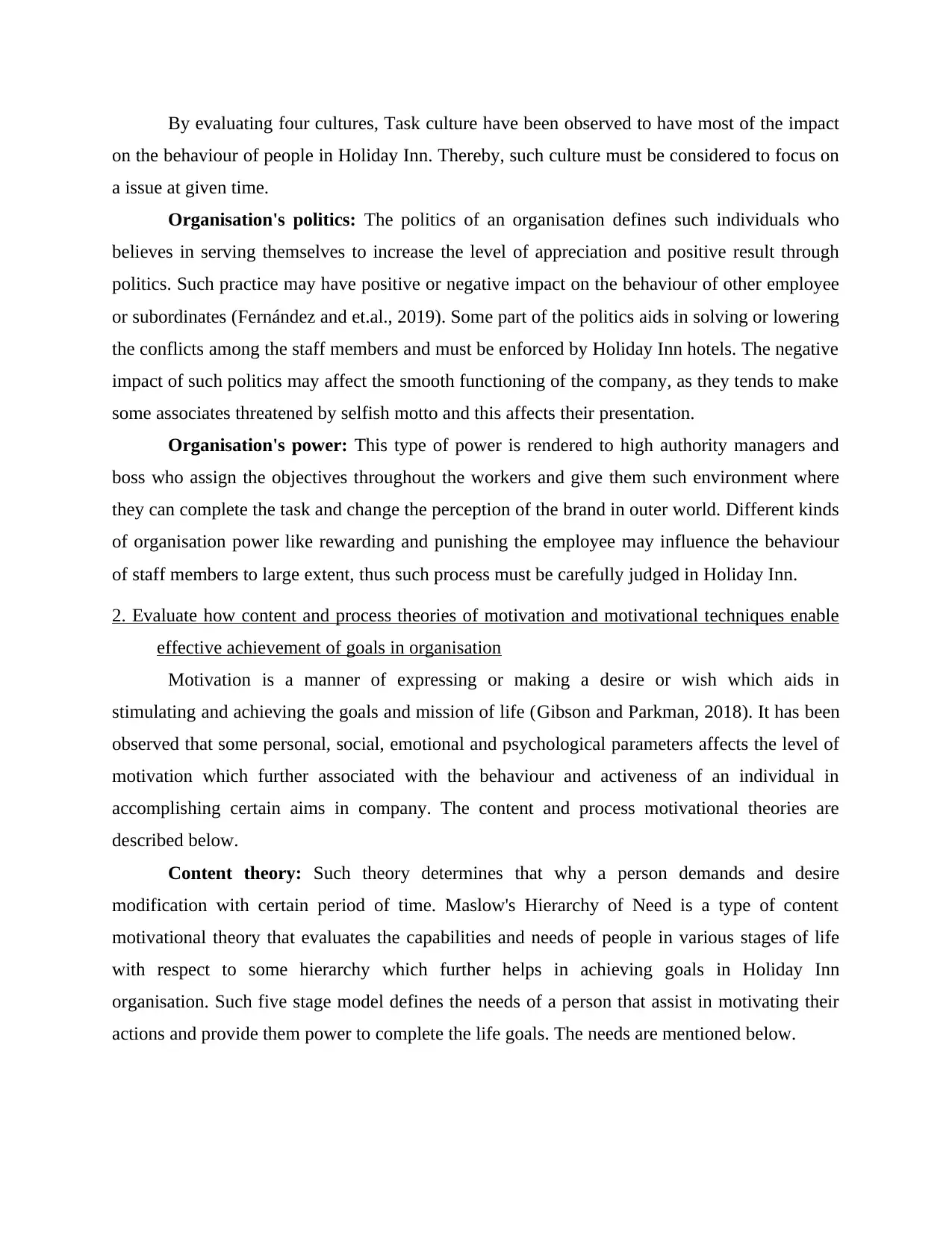
By evaluating four cultures, Task culture have been observed to have most of the impact
on the behaviour of people in Holiday Inn. Thereby, such culture must be considered to focus on
a issue at given time.
Organisation's politics: The politics of an organisation defines such individuals who
believes in serving themselves to increase the level of appreciation and positive result through
politics. Such practice may have positive or negative impact on the behaviour of other employee
or subordinates (Fernández and et.al., 2019). Some part of the politics aids in solving or lowering
the conflicts among the staff members and must be enforced by Holiday Inn hotels. The negative
impact of such politics may affect the smooth functioning of the company, as they tends to make
some associates threatened by selfish motto and this affects their presentation.
Organisation's power: This type of power is rendered to high authority managers and
boss who assign the objectives throughout the workers and give them such environment where
they can complete the task and change the perception of the brand in outer world. Different kinds
of organisation power like rewarding and punishing the employee may influence the behaviour
of staff members to large extent, thus such process must be carefully judged in Holiday Inn.
2. Evaluate how content and process theories of motivation and motivational techniques enable
effective achievement of goals in organisation
Motivation is a manner of expressing or making a desire or wish which aids in
stimulating and achieving the goals and mission of life (Gibson and Parkman, 2018). It has been
observed that some personal, social, emotional and psychological parameters affects the level of
motivation which further associated with the behaviour and activeness of an individual in
accomplishing certain aims in company. The content and process motivational theories are
described below.
Content theory: Such theory determines that why a person demands and desire
modification with certain period of time. Maslow's Hierarchy of Need is a type of content
motivational theory that evaluates the capabilities and needs of people in various stages of life
with respect to some hierarchy which further helps in achieving goals in Holiday Inn
organisation. Such five stage model defines the needs of a person that assist in motivating their
actions and provide them power to complete the life goals. The needs are mentioned below.
on the behaviour of people in Holiday Inn. Thereby, such culture must be considered to focus on
a issue at given time.
Organisation's politics: The politics of an organisation defines such individuals who
believes in serving themselves to increase the level of appreciation and positive result through
politics. Such practice may have positive or negative impact on the behaviour of other employee
or subordinates (Fernández and et.al., 2019). Some part of the politics aids in solving or lowering
the conflicts among the staff members and must be enforced by Holiday Inn hotels. The negative
impact of such politics may affect the smooth functioning of the company, as they tends to make
some associates threatened by selfish motto and this affects their presentation.
Organisation's power: This type of power is rendered to high authority managers and
boss who assign the objectives throughout the workers and give them such environment where
they can complete the task and change the perception of the brand in outer world. Different kinds
of organisation power like rewarding and punishing the employee may influence the behaviour
of staff members to large extent, thus such process must be carefully judged in Holiday Inn.
2. Evaluate how content and process theories of motivation and motivational techniques enable
effective achievement of goals in organisation
Motivation is a manner of expressing or making a desire or wish which aids in
stimulating and achieving the goals and mission of life (Gibson and Parkman, 2018). It has been
observed that some personal, social, emotional and psychological parameters affects the level of
motivation which further associated with the behaviour and activeness of an individual in
accomplishing certain aims in company. The content and process motivational theories are
described below.
Content theory: Such theory determines that why a person demands and desire
modification with certain period of time. Maslow's Hierarchy of Need is a type of content
motivational theory that evaluates the capabilities and needs of people in various stages of life
with respect to some hierarchy which further helps in achieving goals in Holiday Inn
organisation. Such five stage model defines the needs of a person that assist in motivating their
actions and provide them power to complete the life goals. The needs are mentioned below.
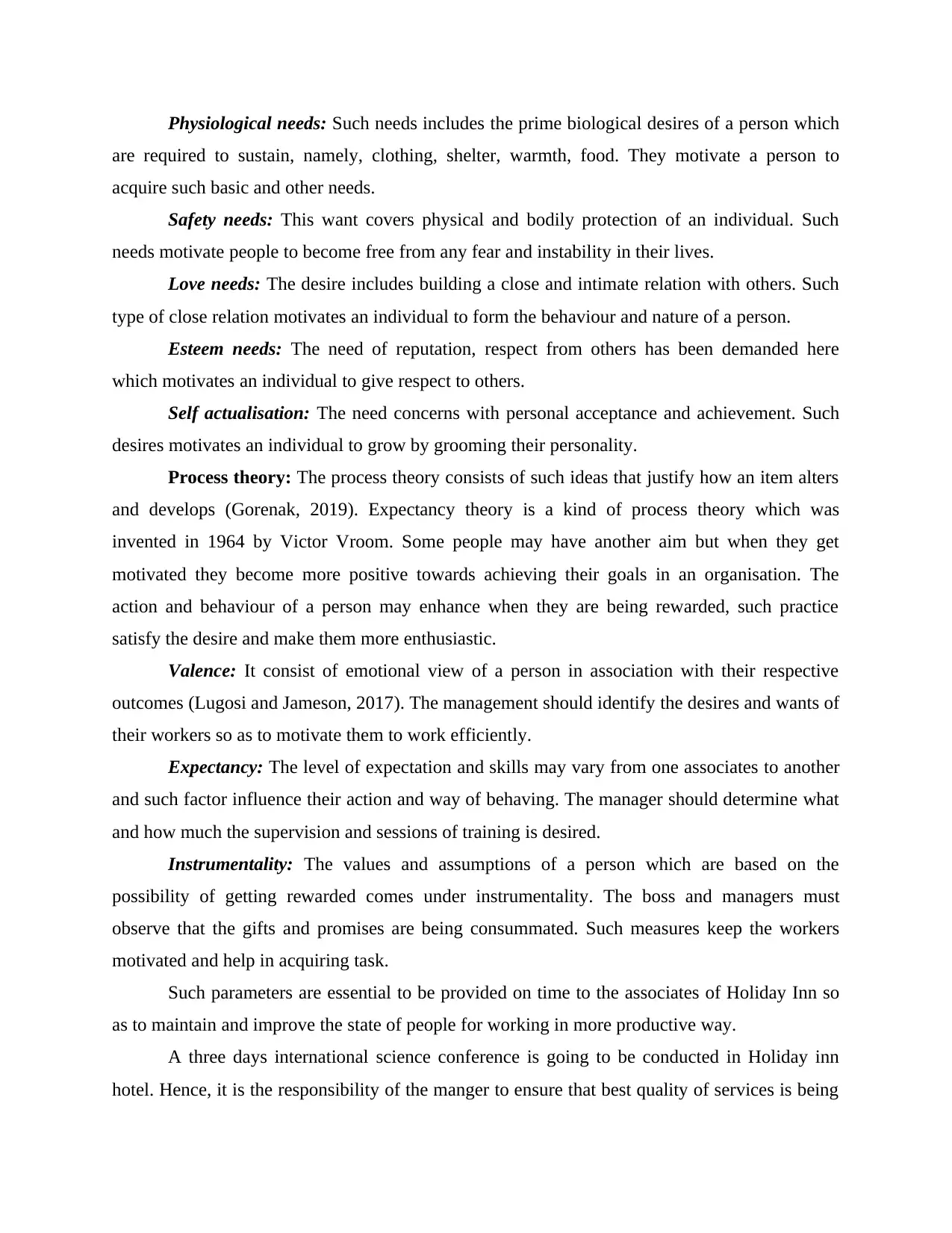
Physiological needs: Such needs includes the prime biological desires of a person which
are required to sustain, namely, clothing, shelter, warmth, food. They motivate a person to
acquire such basic and other needs.
Safety needs: This want covers physical and bodily protection of an individual. Such
needs motivate people to become free from any fear and instability in their lives.
Love needs: The desire includes building a close and intimate relation with others. Such
type of close relation motivates an individual to form the behaviour and nature of a person.
Esteem needs: The need of reputation, respect from others has been demanded here
which motivates an individual to give respect to others.
Self actualisation: The need concerns with personal acceptance and achievement. Such
desires motivates an individual to grow by grooming their personality.
Process theory: The process theory consists of such ideas that justify how an item alters
and develops (Gorenak, 2019). Expectancy theory is a kind of process theory which was
invented in 1964 by Victor Vroom. Some people may have another aim but when they get
motivated they become more positive towards achieving their goals in an organisation. The
action and behaviour of a person may enhance when they are being rewarded, such practice
satisfy the desire and make them more enthusiastic.
Valence: It consist of emotional view of a person in association with their respective
outcomes (Lugosi and Jameson, 2017). The management should identify the desires and wants of
their workers so as to motivate them to work efficiently.
Expectancy: The level of expectation and skills may vary from one associates to another
and such factor influence their action and way of behaving. The manager should determine what
and how much the supervision and sessions of training is desired.
Instrumentality: The values and assumptions of a person which are based on the
possibility of getting rewarded comes under instrumentality. The boss and managers must
observe that the gifts and promises are being consummated. Such measures keep the workers
motivated and help in acquiring task.
Such parameters are essential to be provided on time to the associates of Holiday Inn so
as to maintain and improve the state of people for working in more productive way.
A three days international science conference is going to be conducted in Holiday inn
hotel. Hence, it is the responsibility of the manger to ensure that best quality of services is being
are required to sustain, namely, clothing, shelter, warmth, food. They motivate a person to
acquire such basic and other needs.
Safety needs: This want covers physical and bodily protection of an individual. Such
needs motivate people to become free from any fear and instability in their lives.
Love needs: The desire includes building a close and intimate relation with others. Such
type of close relation motivates an individual to form the behaviour and nature of a person.
Esteem needs: The need of reputation, respect from others has been demanded here
which motivates an individual to give respect to others.
Self actualisation: The need concerns with personal acceptance and achievement. Such
desires motivates an individual to grow by grooming their personality.
Process theory: The process theory consists of such ideas that justify how an item alters
and develops (Gorenak, 2019). Expectancy theory is a kind of process theory which was
invented in 1964 by Victor Vroom. Some people may have another aim but when they get
motivated they become more positive towards achieving their goals in an organisation. The
action and behaviour of a person may enhance when they are being rewarded, such practice
satisfy the desire and make them more enthusiastic.
Valence: It consist of emotional view of a person in association with their respective
outcomes (Lugosi and Jameson, 2017). The management should identify the desires and wants of
their workers so as to motivate them to work efficiently.
Expectancy: The level of expectation and skills may vary from one associates to another
and such factor influence their action and way of behaving. The manager should determine what
and how much the supervision and sessions of training is desired.
Instrumentality: The values and assumptions of a person which are based on the
possibility of getting rewarded comes under instrumentality. The boss and managers must
observe that the gifts and promises are being consummated. Such measures keep the workers
motivated and help in acquiring task.
Such parameters are essential to be provided on time to the associates of Holiday Inn so
as to maintain and improve the state of people for working in more productive way.
A three days international science conference is going to be conducted in Holiday inn
hotel. Hence, it is the responsibility of the manger to ensure that best quality of services is being
⊘ This is a preview!⊘
Do you want full access?
Subscribe today to unlock all pages.

Trusted by 1+ million students worldwide
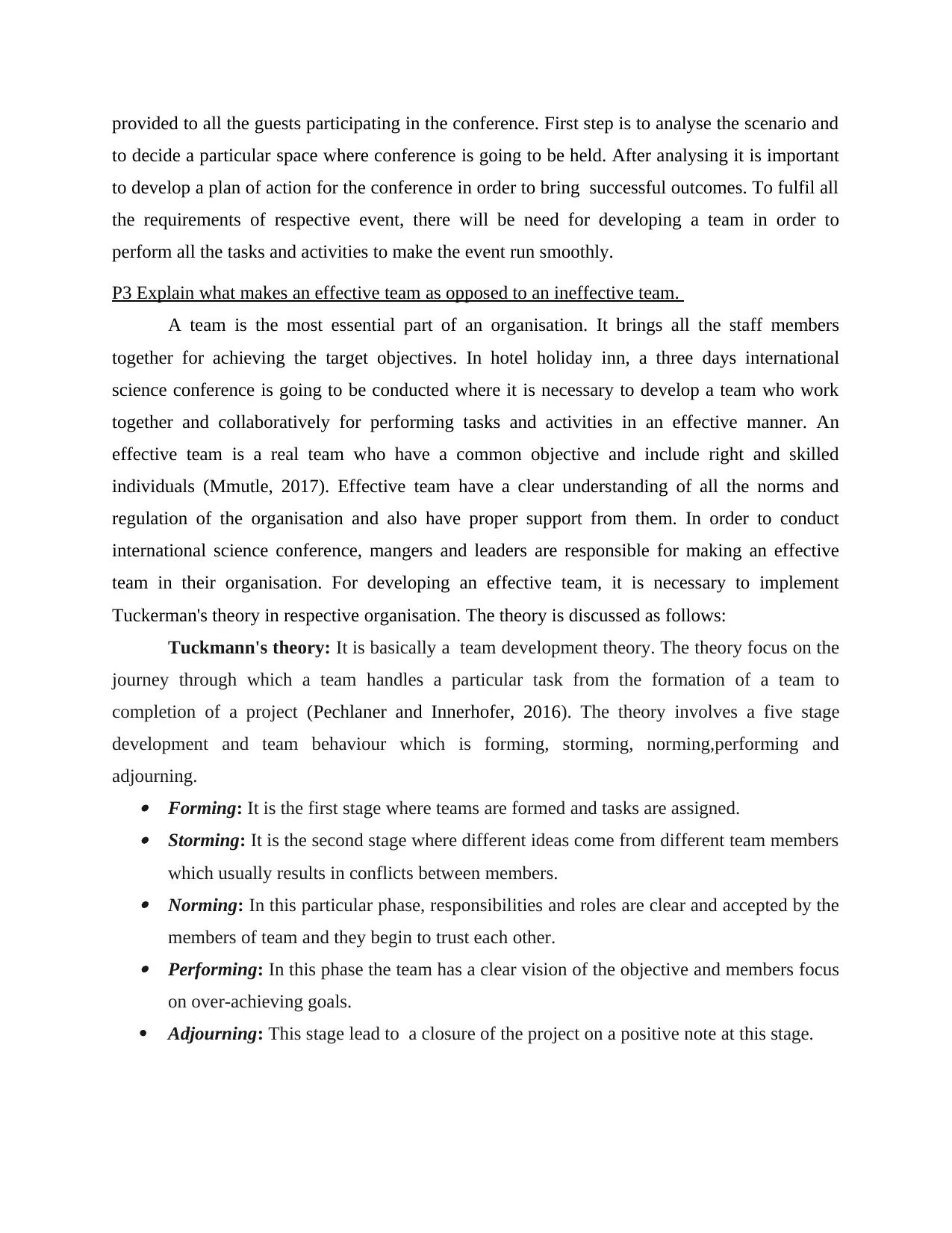
provided to all the guests participating in the conference. First step is to analyse the scenario and
to decide a particular space where conference is going to be held. After analysing it is important
to develop a plan of action for the conference in order to bring successful outcomes. To fulfil all
the requirements of respective event, there will be need for developing a team in order to
perform all the tasks and activities to make the event run smoothly.
P3 Explain what makes an effective team as opposed to an ineffective team.
A team is the most essential part of an organisation. It brings all the staff members
together for achieving the target objectives. In hotel holiday inn, a three days international
science conference is going to be conducted where it is necessary to develop a team who work
together and collaboratively for performing tasks and activities in an effective manner. An
effective team is a real team who have a common objective and include right and skilled
individuals (Mmutle, 2017). Effective team have a clear understanding of all the norms and
regulation of the organisation and also have proper support from them. In order to conduct
international science conference, mangers and leaders are responsible for making an effective
team in their organisation. For developing an effective team, it is necessary to implement
Tuckerman's theory in respective organisation. The theory is discussed as follows:
Tuckmann's theory: It is basically a team development theory. The theory focus on the
journey through which a team handles a particular task from the formation of a team to
completion of a project (Pechlaner and Innerhofer, 2016). The theory involves a five stage
development and team behaviour which is forming, storming, norming,performing and
adjourning. Forming: It is the first stage where teams are formed and tasks are assigned. Storming: It is the second stage where different ideas come from different team members
which usually results in conflicts between members. Norming: In this particular phase, responsibilities and roles are clear and accepted by the
members of team and they begin to trust each other. Performing: In this phase the team has a clear vision of the objective and members focus
on over-achieving goals.
Adjourning: This stage lead to a closure of the project on a positive note at this stage.
to decide a particular space where conference is going to be held. After analysing it is important
to develop a plan of action for the conference in order to bring successful outcomes. To fulfil all
the requirements of respective event, there will be need for developing a team in order to
perform all the tasks and activities to make the event run smoothly.
P3 Explain what makes an effective team as opposed to an ineffective team.
A team is the most essential part of an organisation. It brings all the staff members
together for achieving the target objectives. In hotel holiday inn, a three days international
science conference is going to be conducted where it is necessary to develop a team who work
together and collaboratively for performing tasks and activities in an effective manner. An
effective team is a real team who have a common objective and include right and skilled
individuals (Mmutle, 2017). Effective team have a clear understanding of all the norms and
regulation of the organisation and also have proper support from them. In order to conduct
international science conference, mangers and leaders are responsible for making an effective
team in their organisation. For developing an effective team, it is necessary to implement
Tuckerman's theory in respective organisation. The theory is discussed as follows:
Tuckmann's theory: It is basically a team development theory. The theory focus on the
journey through which a team handles a particular task from the formation of a team to
completion of a project (Pechlaner and Innerhofer, 2016). The theory involves a five stage
development and team behaviour which is forming, storming, norming,performing and
adjourning. Forming: It is the first stage where teams are formed and tasks are assigned. Storming: It is the second stage where different ideas come from different team members
which usually results in conflicts between members. Norming: In this particular phase, responsibilities and roles are clear and accepted by the
members of team and they begin to trust each other. Performing: In this phase the team has a clear vision of the objective and members focus
on over-achieving goals.
Adjourning: This stage lead to a closure of the project on a positive note at this stage.
Paraphrase This Document
Need a fresh take? Get an instant paraphrase of this document with our AI Paraphraser
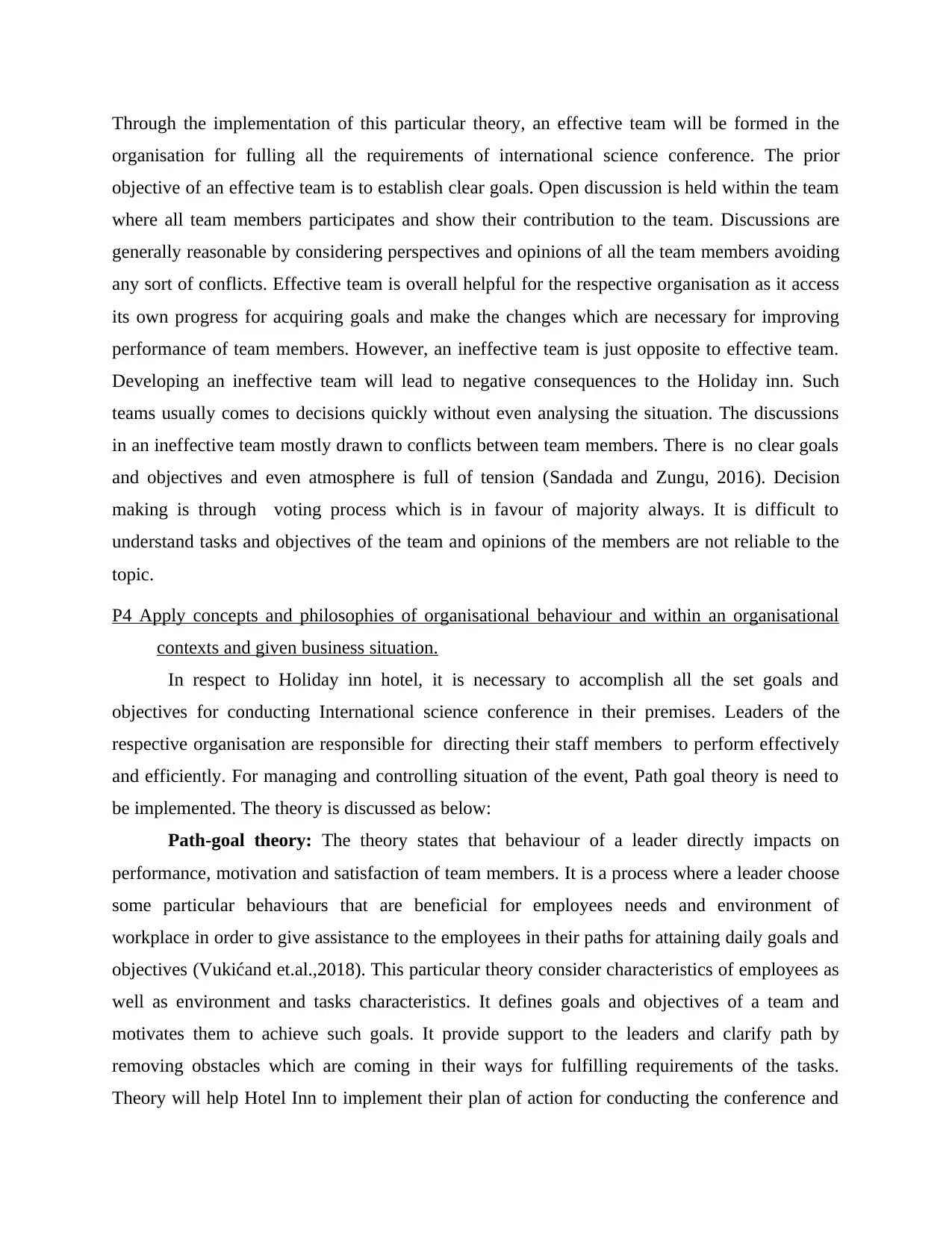
Through the implementation of this particular theory, an effective team will be formed in the
organisation for fulling all the requirements of international science conference. The prior
objective of an effective team is to establish clear goals. Open discussion is held within the team
where all team members participates and show their contribution to the team. Discussions are
generally reasonable by considering perspectives and opinions of all the team members avoiding
any sort of conflicts. Effective team is overall helpful for the respective organisation as it access
its own progress for acquiring goals and make the changes which are necessary for improving
performance of team members. However, an ineffective team is just opposite to effective team.
Developing an ineffective team will lead to negative consequences to the Holiday inn. Such
teams usually comes to decisions quickly without even analysing the situation. The discussions
in an ineffective team mostly drawn to conflicts between team members. There is no clear goals
and objectives and even atmosphere is full of tension (Sandada and Zungu, 2016). Decision
making is through voting process which is in favour of majority always. It is difficult to
understand tasks and objectives of the team and opinions of the members are not reliable to the
topic.
P4 Apply concepts and philosophies of organisational behaviour and within an organisational
contexts and given business situation.
In respect to Holiday inn hotel, it is necessary to accomplish all the set goals and
objectives for conducting International science conference in their premises. Leaders of the
respective organisation are responsible for directing their staff members to perform effectively
and efficiently. For managing and controlling situation of the event, Path goal theory is need to
be implemented. The theory is discussed as below:
Path-goal theory: The theory states that behaviour of a leader directly impacts on
performance, motivation and satisfaction of team members. It is a process where a leader choose
some particular behaviours that are beneficial for employees needs and environment of
workplace in order to give assistance to the employees in their paths for attaining daily goals and
objectives (Vukićand et.al.,2018). This particular theory consider characteristics of employees as
well as environment and tasks characteristics. It defines goals and objectives of a team and
motivates them to achieve such goals. It provide support to the leaders and clarify path by
removing obstacles which are coming in their ways for fulfilling requirements of the tasks.
Theory will help Hotel Inn to implement their plan of action for conducting the conference and
organisation for fulling all the requirements of international science conference. The prior
objective of an effective team is to establish clear goals. Open discussion is held within the team
where all team members participates and show their contribution to the team. Discussions are
generally reasonable by considering perspectives and opinions of all the team members avoiding
any sort of conflicts. Effective team is overall helpful for the respective organisation as it access
its own progress for acquiring goals and make the changes which are necessary for improving
performance of team members. However, an ineffective team is just opposite to effective team.
Developing an ineffective team will lead to negative consequences to the Holiday inn. Such
teams usually comes to decisions quickly without even analysing the situation. The discussions
in an ineffective team mostly drawn to conflicts between team members. There is no clear goals
and objectives and even atmosphere is full of tension (Sandada and Zungu, 2016). Decision
making is through voting process which is in favour of majority always. It is difficult to
understand tasks and objectives of the team and opinions of the members are not reliable to the
topic.
P4 Apply concepts and philosophies of organisational behaviour and within an organisational
contexts and given business situation.
In respect to Holiday inn hotel, it is necessary to accomplish all the set goals and
objectives for conducting International science conference in their premises. Leaders of the
respective organisation are responsible for directing their staff members to perform effectively
and efficiently. For managing and controlling situation of the event, Path goal theory is need to
be implemented. The theory is discussed as below:
Path-goal theory: The theory states that behaviour of a leader directly impacts on
performance, motivation and satisfaction of team members. It is a process where a leader choose
some particular behaviours that are beneficial for employees needs and environment of
workplace in order to give assistance to the employees in their paths for attaining daily goals and
objectives (Vukićand et.al.,2018). This particular theory consider characteristics of employees as
well as environment and tasks characteristics. It defines goals and objectives of a team and
motivates them to achieve such goals. It provide support to the leaders and clarify path by
removing obstacles which are coming in their ways for fulfilling requirements of the tasks.
Theory will help Hotel Inn to implement their plan of action for conducting the conference and
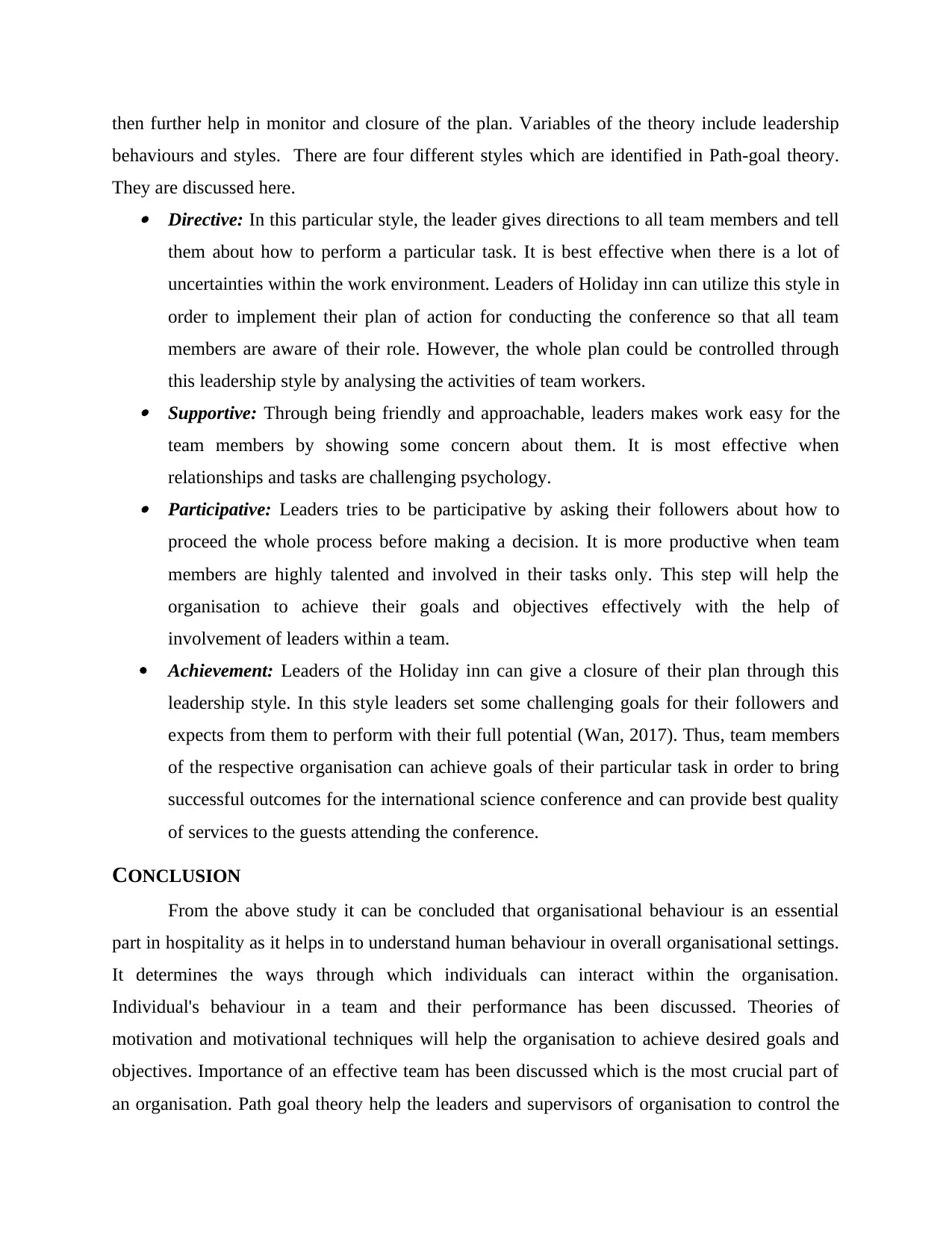
then further help in monitor and closure of the plan. Variables of the theory include leadership
behaviours and styles. There are four different styles which are identified in Path-goal theory.
They are discussed here. Directive: In this particular style, the leader gives directions to all team members and tell
them about how to perform a particular task. It is best effective when there is a lot of
uncertainties within the work environment. Leaders of Holiday inn can utilize this style in
order to implement their plan of action for conducting the conference so that all team
members are aware of their role. However, the whole plan could be controlled through
this leadership style by analysing the activities of team workers. Supportive: Through being friendly and approachable, leaders makes work easy for the
team members by showing some concern about them. It is most effective when
relationships and tasks are challenging psychology. Participative: Leaders tries to be participative by asking their followers about how to
proceed the whole process before making a decision. It is more productive when team
members are highly talented and involved in their tasks only. This step will help the
organisation to achieve their goals and objectives effectively with the help of
involvement of leaders within a team.
Achievement: Leaders of the Holiday inn can give a closure of their plan through this
leadership style. In this style leaders set some challenging goals for their followers and
expects from them to perform with their full potential (Wan, 2017). Thus, team members
of the respective organisation can achieve goals of their particular task in order to bring
successful outcomes for the international science conference and can provide best quality
of services to the guests attending the conference.
CONCLUSION
From the above study it can be concluded that organisational behaviour is an essential
part in hospitality as it helps in to understand human behaviour in overall organisational settings.
It determines the ways through which individuals can interact within the organisation.
Individual's behaviour in a team and their performance has been discussed. Theories of
motivation and motivational techniques will help the organisation to achieve desired goals and
objectives. Importance of an effective team has been discussed which is the most crucial part of
an organisation. Path goal theory help the leaders and supervisors of organisation to control the
behaviours and styles. There are four different styles which are identified in Path-goal theory.
They are discussed here. Directive: In this particular style, the leader gives directions to all team members and tell
them about how to perform a particular task. It is best effective when there is a lot of
uncertainties within the work environment. Leaders of Holiday inn can utilize this style in
order to implement their plan of action for conducting the conference so that all team
members are aware of their role. However, the whole plan could be controlled through
this leadership style by analysing the activities of team workers. Supportive: Through being friendly and approachable, leaders makes work easy for the
team members by showing some concern about them. It is most effective when
relationships and tasks are challenging psychology. Participative: Leaders tries to be participative by asking their followers about how to
proceed the whole process before making a decision. It is more productive when team
members are highly talented and involved in their tasks only. This step will help the
organisation to achieve their goals and objectives effectively with the help of
involvement of leaders within a team.
Achievement: Leaders of the Holiday inn can give a closure of their plan through this
leadership style. In this style leaders set some challenging goals for their followers and
expects from them to perform with their full potential (Wan, 2017). Thus, team members
of the respective organisation can achieve goals of their particular task in order to bring
successful outcomes for the international science conference and can provide best quality
of services to the guests attending the conference.
CONCLUSION
From the above study it can be concluded that organisational behaviour is an essential
part in hospitality as it helps in to understand human behaviour in overall organisational settings.
It determines the ways through which individuals can interact within the organisation.
Individual's behaviour in a team and their performance has been discussed. Theories of
motivation and motivational techniques will help the organisation to achieve desired goals and
objectives. Importance of an effective team has been discussed which is the most crucial part of
an organisation. Path goal theory help the leaders and supervisors of organisation to control the
⊘ This is a preview!⊘
Do you want full access?
Subscribe today to unlock all pages.

Trusted by 1+ million students worldwide
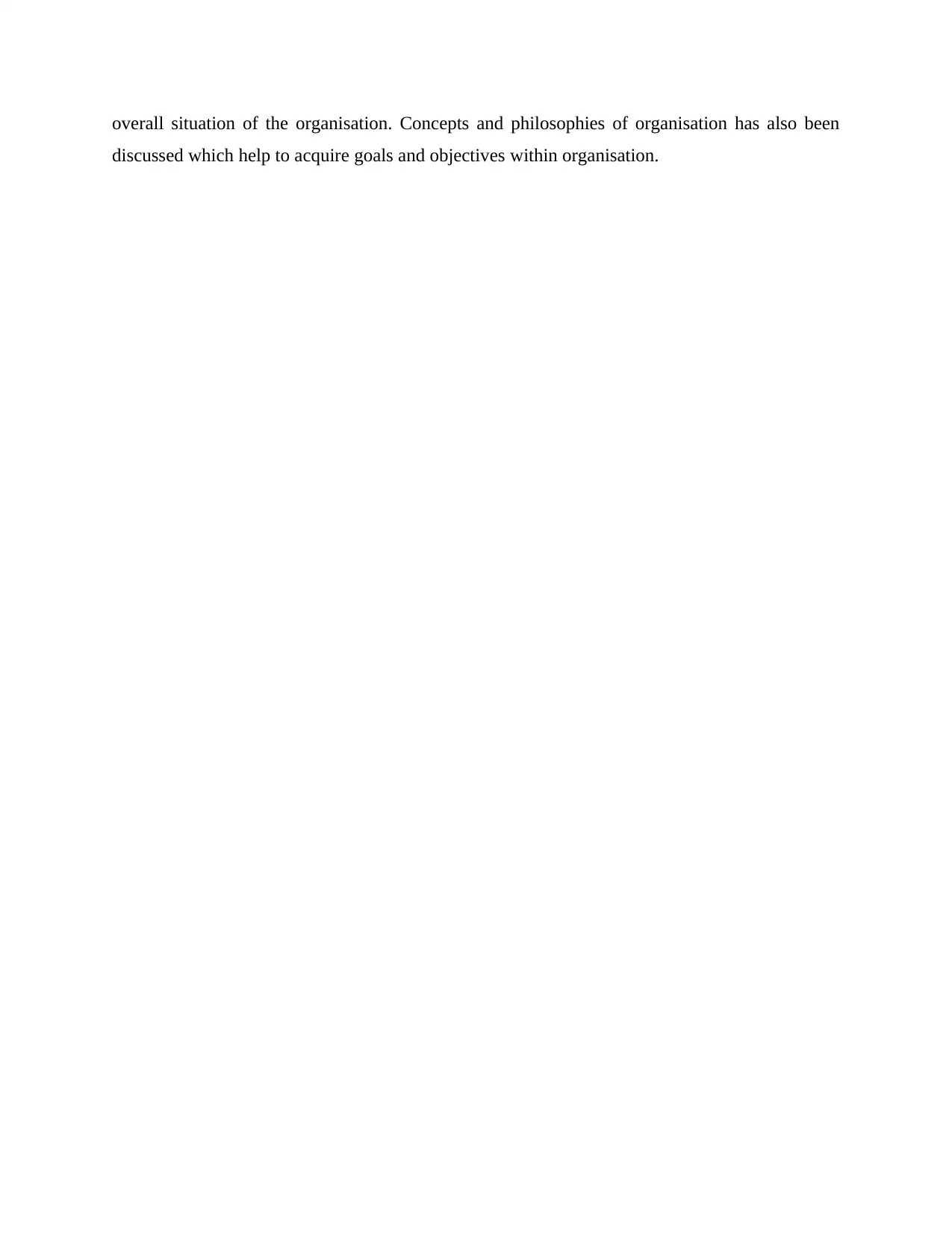
overall situation of the organisation. Concepts and philosophies of organisation has also been
discussed which help to acquire goals and objectives within organisation.
discussed which help to acquire goals and objectives within organisation.
Paraphrase This Document
Need a fresh take? Get an instant paraphrase of this document with our AI Paraphraser
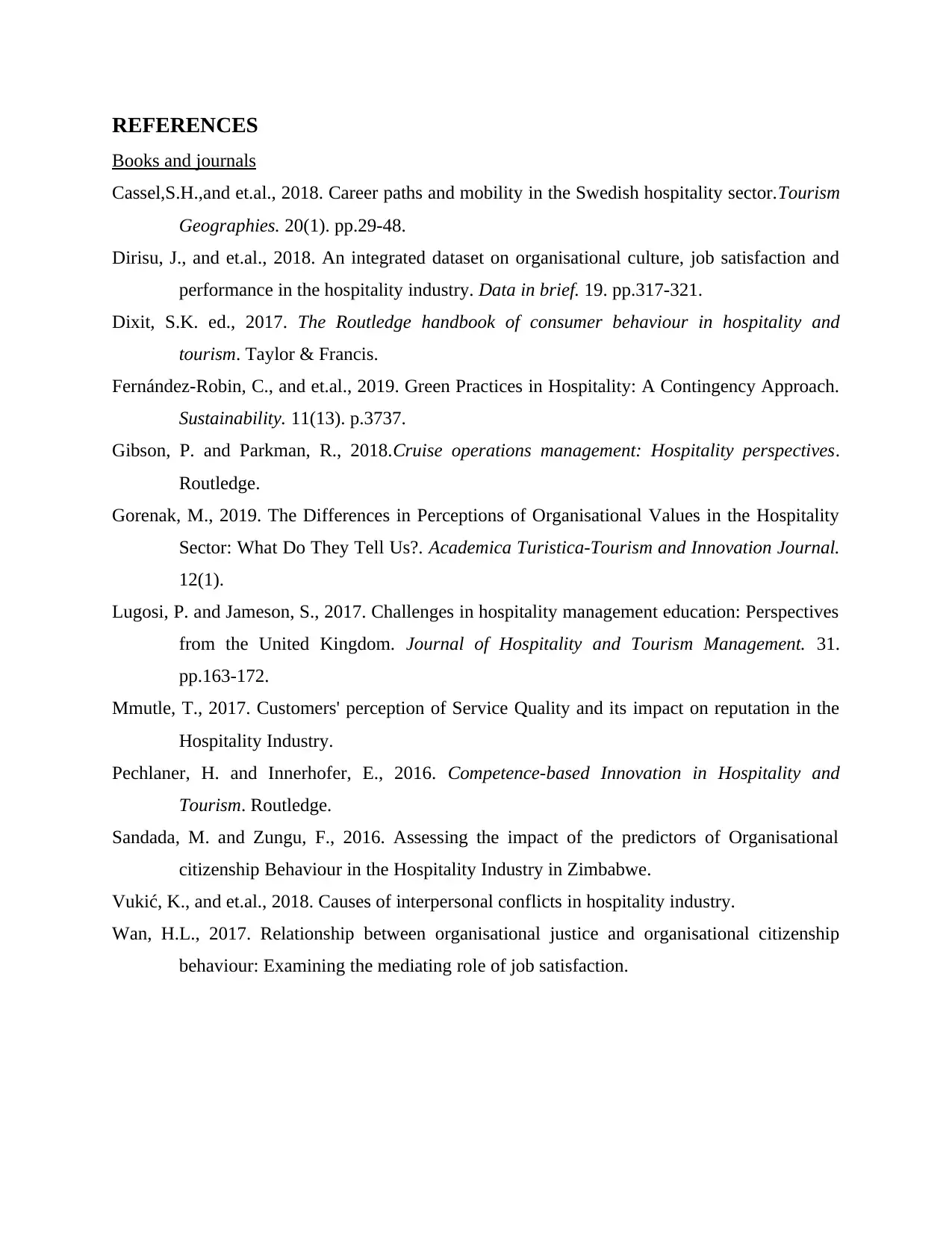
REFERENCES
Books and journals
Cassel,S.H.,and et.al., 2018. Career paths and mobility in the Swedish hospitality sector.Tourism
Geographies. 20(1). pp.29-48.
Dirisu, J., and et.al., 2018. An integrated dataset on organisational culture, job satisfaction and
performance in the hospitality industry. Data in brief. 19. pp.317-321.
Dixit, S.K. ed., 2017. The Routledge handbook of consumer behaviour in hospitality and
tourism. Taylor & Francis.
Fernández-Robin, C., and et.al., 2019. Green Practices in Hospitality: A Contingency Approach.
Sustainability. 11(13). p.3737.
Gibson, P. and Parkman, R., 2018.Cruise operations management: Hospitality perspectives.
Routledge.
Gorenak, M., 2019. The Differences in Perceptions of Organisational Values in the Hospitality
Sector: What Do They Tell Us?. Academica Turistica-Tourism and Innovation Journal.
12(1).
Lugosi, P. and Jameson, S., 2017. Challenges in hospitality management education: Perspectives
from the United Kingdom. Journal of Hospitality and Tourism Management. 31.
pp.163-172.
Mmutle, T., 2017. Customers' perception of Service Quality and its impact on reputation in the
Hospitality Industry.
Pechlaner, H. and Innerhofer, E., 2016. Competence-based Innovation in Hospitality and
Tourism. Routledge.
Sandada, M. and Zungu, F., 2016. Assessing the impact of the predictors of Organisational
citizenship Behaviour in the Hospitality Industry in Zimbabwe.
Vukić, K., and et.al., 2018. Causes of interpersonal conflicts in hospitality industry.
Wan, H.L., 2017. Relationship between organisational justice and organisational citizenship
behaviour: Examining the mediating role of job satisfaction.
Books and journals
Cassel,S.H.,and et.al., 2018. Career paths and mobility in the Swedish hospitality sector.Tourism
Geographies. 20(1). pp.29-48.
Dirisu, J., and et.al., 2018. An integrated dataset on organisational culture, job satisfaction and
performance in the hospitality industry. Data in brief. 19. pp.317-321.
Dixit, S.K. ed., 2017. The Routledge handbook of consumer behaviour in hospitality and
tourism. Taylor & Francis.
Fernández-Robin, C., and et.al., 2019. Green Practices in Hospitality: A Contingency Approach.
Sustainability. 11(13). p.3737.
Gibson, P. and Parkman, R., 2018.Cruise operations management: Hospitality perspectives.
Routledge.
Gorenak, M., 2019. The Differences in Perceptions of Organisational Values in the Hospitality
Sector: What Do They Tell Us?. Academica Turistica-Tourism and Innovation Journal.
12(1).
Lugosi, P. and Jameson, S., 2017. Challenges in hospitality management education: Perspectives
from the United Kingdom. Journal of Hospitality and Tourism Management. 31.
pp.163-172.
Mmutle, T., 2017. Customers' perception of Service Quality and its impact on reputation in the
Hospitality Industry.
Pechlaner, H. and Innerhofer, E., 2016. Competence-based Innovation in Hospitality and
Tourism. Routledge.
Sandada, M. and Zungu, F., 2016. Assessing the impact of the predictors of Organisational
citizenship Behaviour in the Hospitality Industry in Zimbabwe.
Vukić, K., and et.al., 2018. Causes of interpersonal conflicts in hospitality industry.
Wan, H.L., 2017. Relationship between organisational justice and organisational citizenship
behaviour: Examining the mediating role of job satisfaction.
1 out of 11
Related Documents
Your All-in-One AI-Powered Toolkit for Academic Success.
+13062052269
info@desklib.com
Available 24*7 on WhatsApp / Email
![[object Object]](/_next/static/media/star-bottom.7253800d.svg)
Unlock your academic potential
Copyright © 2020–2026 A2Z Services. All Rights Reserved. Developed and managed by ZUCOL.




